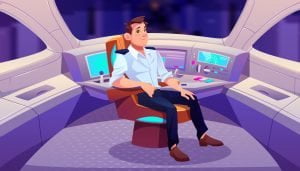
Role & Responsibilities of an Aerospace Engineer
- An aerospace engineer must be able to perform the following tasks to fulfill the demands of his or her position.
- Resolving complex engineering and design issues in the aerospace industry.
- Repairing defective products and components as well as identifying the source of the problem and finding a possible solution.
- Build a mathematical model based on the requirements of the mission profile.
- An aeronautical engineer is responsible for designing, analyzing and producing the overall structure of an aircraft.
- Analyze statistics and computational methods to predict flight characteristics using computer models.
- Identify and develop the necessary propulsion and control systems.
- Upon successful completion of the prototypes, plan and coordinate the manufacture of the final product.
- To determine if the aeronautical products are capable of meeting the requirements of the mission profile, analyze and test their performance.
- Investigation and estimation of aircraft component safety.
- Developing new methods to increase efficiency through research and development.
- Analysis of aircraft aerodynamic parameters and performance.
- Investigate the application of new technologies in aerospace.
What Are The Requirements For Becoming An Aerospace Engineer?
Here are some the requirements of becoming an aerospace engineer suggested by Canada study abroad consultants:- Analytical and problem-solving skills
- Accuracy and speed
- Being creative and able to see alternative approaches to problems
- An excellent understanding of mathematics and mechanics
- Communication skills
- Aeronautical and scientific interests
- Expertise in the technical field
- Meet deadlines under pressure
- Having concerns about safety
- Responsible behavior
Where Does an Aerospace Engineer Work?
The majority of the time that aerospace engineers spend in an office setting is spent working on advanced computer equipment and sophisticated software programs. There are times when an Aerospace Engineer finds themselves working in a manufacturing environment in order to supervise the construction and implementation of a design. An aerospace engineer works full-time on a regular schedule. However, if a project is large, overtime hours are likely to be required, especially if a deadline is approaching. It is anticipated that the demand for aerospace engineers will increase by 8% between 2020 and 2030. In order to maintain national security, aircraft will continue to be needed. In addition, a growing interest in environmental safety will require plans to be restructured to maximize fuel efficiency.What Are The Requirements For Becoming A Professional Aerospace Engineer?
It is typically necessary for aerospace engineers to hold at least a Bachelor of Science degree in aerospace engineering. The majority of university programs offer a five-year program that allows students to earn a bachelor’s and a master’s degree simultaneously. The aerospace engineer degree is accredited by the Accreditation Board for Engineering and Technology. Even though entry-level positions are not required to be licensed, more advanced programs in Aerospace Engineering will probably require a Professional Engineer license. There are a number of requirements of an aerospace engineer degree that vary from university to universities, but most require an accredited engineering degree, work experience, and a passing performance on both the Fundamentals of Engineering (FE) exam and the Professional Engineering Exam. For an Aaerospace engineer to acquire a managerial position, it is often necessary to gain extensive experience in the field and to shadow a senior engineer.
Lean How To Become An Aeronautical Engineer
Here are few things you must know about how to become an aeronautical engineer:- Take Advanced Math & Science Classes In High School
- Obtain A Bachelor’s Degree In Aerospace Engineering
- Earn A Graduate Degree In Aerospace Engineering
- Select Suitable Hobbies & Extracurricular Activities
- Choose A Suitable Minor


